
The brown-headed barbet is an Asian barbet species native to the Indian subcontinent, where it inhabits tropical and subtropical moist broadleaf forests.
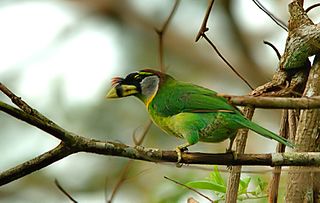
Megalaimidae, the Asian barbets, are a family of birds, comprising two genera with 34 species native to the forests of the Indomalayan realm from Tibet to Indonesia. They were once clubbed with all barbets in the family Capitonidae but the Old World species have been found to be distinctive and are considered, along with the Lybiidae and Ramphastidae, as sister groups. In the past the species were placed in three genera, Caloramphus, Megalaima and Psilopogon, but studies show that Psilopogon to be nested within the clade of Megalaima. Since members of this clade are better treated under a single genus, they have been moved to the genus Psilopogon which was described and erected earlier than Megalaima and is therefore chosen on the basis of taxonomic priority principles. Nearly all members of the family are now in the genus Psilopogon, with the exception of those in Caloramphus, which are thought to have genetically diverged from the common ancestor around 21.32 million years ago. The latter species are distinct enough to warrant placement in a subfamily Caloramphinae. The family name is derived from that of the genus Megalaima which means ‘large throat’, from the Greek mega and laimos.

The great barbet is an Asian barbet native to the Indian sub-continent and Southeast Asia, where it inhabits foremost forests up to 3,000 m (9,800 ft) altitude. It has been listed as Least Concern on the IUCN Red List since 2004 because of its wide distribution.

The blue-eared barbet is a barbet in the Megalaimidae family native to mainland Southeast Asia. Because of its wide distribution and stable population it is listed as Least Concern on the IUCN Red List.
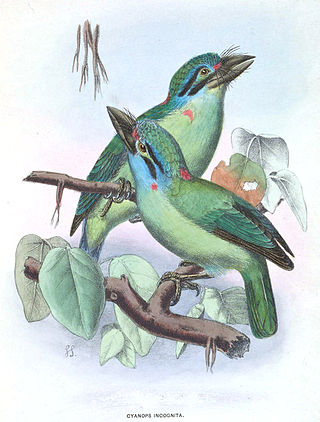
The moustached barbet is an Asian barbet. Barbets are a group of near passerine birds with a world-wide tropical distribution. They get their name from the bristles which fringe their heavy bills.

The black-browed barbet is an Asian barbet native to Peninsular Malaysia and Sumatra, where it inhabits foremost forests between 600 and 2,000 m altitude. It is listed as Least Concern on the IUCN Red List because of its wide distribution and stable population.

The golden-whiskered barbet is an Asian barbet species native to the western Malay Archipelago, where it inhabits foremost forests up to 1,500 m (4,900 ft) elevation. It has been listed as Least Concern on the IUCN Red List since 2004 because of its wide distribution.
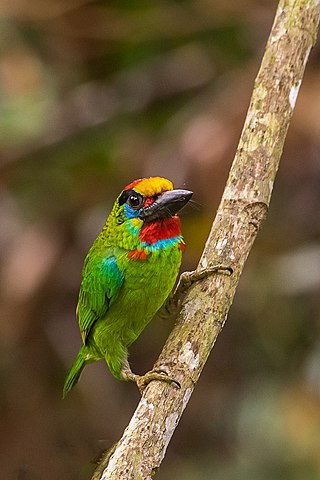
The red-throated barbet is a species of bird in the family Megalaimidae. It is found in Brunei, Indonesia, Malaysia, Myanmar, Singapore, and Thailand. Its natural habitats are subtropical or tropical moist lowland forest and subtropical or tropical swamps. It is threatened by habitat loss.

The golden-naped barbet is a member of the family Megalaimidae. It is found in Indonesia and Malaysia, where it is endemic to the island of Borneo. Its natural habitats are subtropical or tropical moist lowland forest and subtropical or tropical moist montane forest.

The red-crowned barbet is part of one of the two subfamilies of Megalaimidae birds. it is in the order of woodpeckers (Piciformes) and their relatives. It is distributed in Myanmar, Thailand, Malaysia, Singapore, Indonesia and Brunei. Its natural habitats are subtropical or tropical moist lowland forests and plantations with a breeding distance of 3,180,000 km (1,980,000 mi).
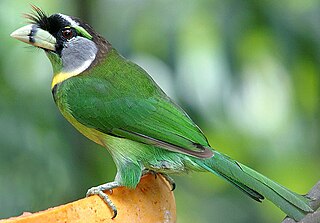
The fire-tufted barbet is a species of bird in the Asian barbet family Megalaimidae. It is native to Peninsular Malaysia and Sumatra, where it inhabits tropical moist lowland and montane forests. It has been listed as Least Concern on the IUCN Red List since 2004. Its scientific name was proposed by Salomon Müller in 1836, who described a barbet from Sumatra.

The yellow-eared toucanet is a near-passerine bird in the toucan family Ramphastidae. It is found from Honduras to Ecuador.

The Taiwan barbet, also known as the embroidered barbet, is a species of bird endemic to the country of Taiwan.
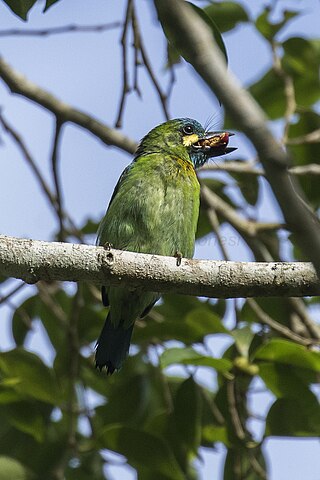
The yellow-eared barbet is an Asian barbet native to Java and Bali. It inhabits shrubland and forest up to an altitude of 2,000 m (6,600 ft).
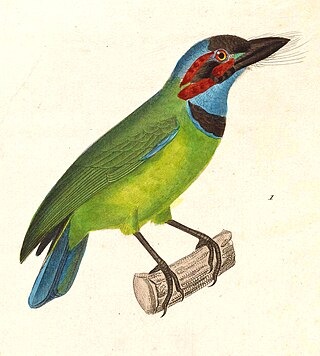
The black-eared barbet is a barbet in the family Megalaimidae native to Peninsular Malaysia, Sumatra and Borneo. It inhabits shrubland and forest up to an altitude of 1,200 m (3,900 ft). Because of its large range it is listed as least concern on the IUCN Red List.


















